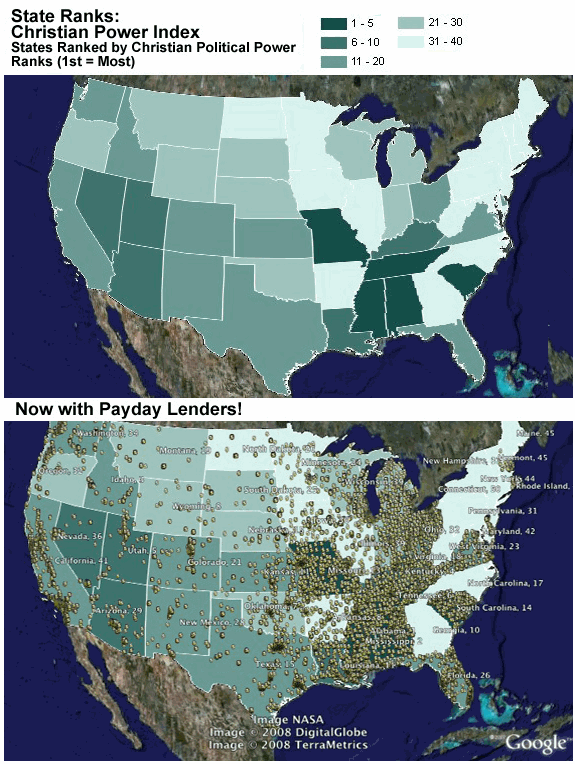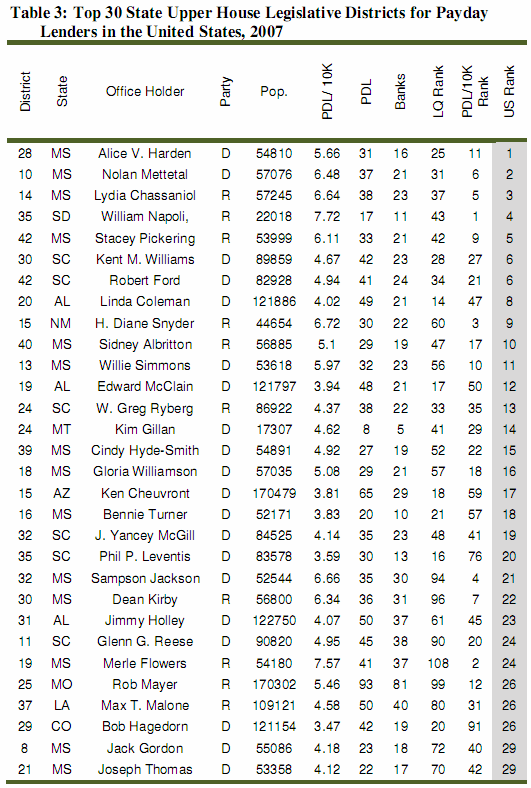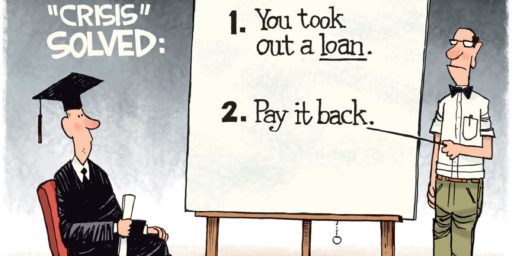Usury Laws, the Christian Right, and Bad Statistics
 A study (or, rather, a report on said study) by two law professors on the relationship between the availability of high-interest payday loans and representation by Christian conservative legislators is generating some blogospheric commentary.
A study (or, rather, a report on said study) by two law professors on the relationship between the availability of high-interest payday loans and representation by Christian conservative legislators is generating some blogospheric commentary.
The study’s abstract:
The culture war has become a national moniker describing a variety of policy debates between social conservatives and secular liberal Americans. Hotly contested battle grounds in this metaphorical war have included abortion policy, affirmative action, the right to bear arms, and gay marriage. Frequently these debates have divided secular Americans from people of faith. This article explores this cultural divide in the context of consumer financial services. In the past fifteen to twenty years America has witnessed a stunning transformation in financial services offered to lower and lower-middle classes. A new breed of fringe creditors charging prices far in excess of the old mafia loan sharking syndicates have spread throughout much of the country. The archetype of fringe creditors commonly referred to as payday lenders, charges average simple nominal annual interest rates of around 450 percent. This Article presents empirical research based on the largest, most comprehensive database of payday loan locations yet created. Payday lender locations are compared to an index measuring the political power of conservative Christian Americans in all fifty states. We conclude that there is a strong correlation between the density of payday lending industry and the political power of conservative Christians, suggesting that conservative Christians have become a prime demographic target of payday lenders. These findings are further discussed in light of Biblical injunctions against usury.
HuffPo‘s Russell Shaw weighs in with “‘Usury Maps’ Show Hypocrisy of Many ‘Christian Conservative’ Pols.”
It seems as though the states with the weakest, or non-existent laws against the type of usury often offered by predatory payday loan lenders are also among the most traditionally- and let’s call a “spade a spade” Christian conservative/Mormon conservative, church attending, conservative-voting pious. In fact, if you look at these two maps, you will see a high degree of correlation between piety and states where payday loan usury is statutorily tolerated.
In my mind, when a family in an economic rough patch has to pay 500% interest on a payday loan, or gets foreclosed upon, that creates threats to marriage far, far more than any two guys getting hitched at the county courthouse does. In fact the latter presents no threat at all.
Why is this? Is it because so many conservative politicians are really more motivated by corporate donors than the Bible they profess adherence to?
FireDogLake‘s Marcy Wheeler piles on with “Time to Throw the Payday Moneylenders out of the Christian Conservative Temples.”
The people preying on the financial insecurity of working people are also some of the people bank-rolling the preachers who give Republicans moral cover for their immoral ways.
Unbossed‘s smintheus muses,
You’d have thought that usury would be little practiced in areas of the country where large numbers of conservative Christians go so far as to declare that the Bible is the received word of the Almighty, reflecting His will, His interests, and even His grammatical tendencies. But in fact the opposite is true. The worst and most shameless form of legalized usury, the payday lender, is most prevelant in the Bible belt and least common in the liberal Northeast.
It turns out, though, that the study demonstrates very little. Relying on simple correlation, it finds that there are a lot of payday loan facilities per capita in areas that are represented by legislators whose voting record shows them to be strong social conservatives. That’s it. Everything else is inference and snide suggestion.
Where are the control variables? I don’t know a lot about payday loans but I’m guessing they’re more popular with people living paycheck-to-paycheck than among the relatively affluent. But there are no controls for that — or anything else — to ensure that social conservatism isn’t spurious.
Using simple correlation as a means of analyzing complex social phenomena is, quite literally, a joke. Or, should I say, an endless series of them. Drowning deaths and ice cream sales. Ministers’ salaries and the price of vodka. The number of doctors, fire trucks, and cops and deaths by disease, property damage from fire, and crimes.
 Indeed, the study authors found that there was an incredible correlation between the recent rise of payday loan facilities and that of Starbucks Coffee franchises. They dismiss this by saying, “There is, of course, no relationship between the Starbucks and payday lending.” Yet they offer no more evidence that the correlation between legislative representation and payday lending is meaningful. Maybe people are spending too much on coffee and need to borrow some money?
Indeed, the study authors found that there was an incredible correlation between the recent rise of payday loan facilities and that of Starbucks Coffee franchises. They dismiss this by saying, “There is, of course, no relationship between the Starbucks and payday lending.” Yet they offer no more evidence that the correlation between legislative representation and payday lending is meaningful. Maybe people are spending too much on coffee and need to borrow some money?
Further, the authors didn’t even measure the actual issuance of payday loans or the amount of said loans — just the number of facilities offering them. And, while they insinuate that legislators are being silent on the issue because they’re getting massive campaign contributions from the industry, they provide no statistical data to back their argument.
It’s worth noting, by the way, that “Christian Right” here is not synonymous with “Republican.” Look at this chart from the study:
Twenty of the thirty representatives are Democrats while only ten are Republican.
A more useful column to look at on that table, though, is the second one: State. A whopping 23 of 30 are from Alabama, Mississippi, and South Carolina.
The distributions are somewhat different if one looks at U.S. House Districts rather than state legislature, with a more even distribution of Democrats and Republicans (17 and 13, respectively) and the inclusion of more states, with AL, MS, and SC dropping to only about half the distribution and Tennessee, Louisiana, and Missouri gaining more slots.
Again, though, I’d guess that poverty rather than religiosity is the more salient variable.
Here’s the other strange thing about the study: The tables all rank order localities by payday loan availability and then fit in the correlations with the voting records of its legislators. If the intent is to show that the latter is the dependent variable and the former independent, wouldn’t doing the reverse make more sense? For example, Georgia, one of the most socially conservative states in the country, outlaws payday lending. Yet that fact is almost hidden in the tables.
Now, none of this is to dismiss the initial premise of the study authors — that there are myriad biblical injuctions against usury and yet social conservatives seem less energized to make laws about this issue than, say, gambling, alcohol consumption, or homosexuality. But that’s a discussion that can be had without misleading statistical analyses.







Is Georgia really that high on the list? Even with Atlanta in the mix? Hard to believe.
I file this whole thing as more of a “yet another example of how the Republicans have fooled people into voting against their and their neighbors’ best interests” piece.
But this study is at the community level, not the state level. So rural Georgia should be showing up as high religion, no payday loans.
Except that the state senators are overwhelmingly Democrats and the U.S. Reps are slightly more Dem than Republican.
This seems nothing more than an attempt to make both Christians and conservatives look bad. Half baked studies like this have no place in public discourse.
As James said, the statistics may be bad, but the argument is very good.
Why indeed do (today’s) Christians feel no need to speak out against usury when the Bible does so forcefully?
Why indeed do (today’s) Christians feel no need to speak out against usury when the Bible does so forcefully?
Because they know which side of the bread is buttered.
It is pretty comical, however, to see enormous effort on the evangelical’s part wrt gay marriage which – quite frankly – is an issue with purely symbolic importance on their part while such issues which quite literally affect major portions of the population which their religion is quite explicit about.
But then, the bible is quite explicit about money changers in the temple, turning religion into a business and the explicit exhortation to not mix religion and politics.
That never seems to stop the mega churches, making millions via televangelism and Ralph Reed. Much easier to flack for votes by bringing out der Gay – why solve actual problems and risk being branded a liberal?
James,
Good analysis. One of my favorite examples of the correlation / causation conundrum is that the migration patterns of storks and births in NYC are highly, positively correlated. Does this mean that storks deliver babies?
Laurence,
The usury mentioned in the Bible referred to the charging of interest on money, period. We are centuries past that debate. Outrageous interest rates is a matter of fairness and is a proper subject of debate. It doesn’t represent any hypocrisy on the part of Christians.
Robert
We are centuries past that debate.
Really. I guess you really haven’t talked to any evangelicals lately (full disclosure, I come from a whole family of ’em). “Literal interpretation of the bible” isn’t just a catchy phrase to them.
It doesn’t represent any hypocrisy on the part of Christians.
Glad we just have your say so on that.
TO: James Joyner
RE: Missing Information
“Now, none of this is to dismiss the initial premise of the study authors — that there are myriad biblical injuctions against usury.” — James Joyner
What’s missing is the religious beliefs of the elected officials in Table 3 (above).
This goes well beyond merely what they profess and what church they go to and how often and what they tithe.
As some Wag pointed out, around 2000 years ago….
But it is an interesting start that two-thirds of the elected officials in your Table 3 are Democrats.
However, without the missing information one cannot properly identify what affect their religious beliefs play in this ‘study’.
In otherwords….
….this is a seriously flawed study. And it wasn’t worth the time necessary to key it in….
….unless you were interested in spreading propaganda.
Regards,
Chuck(le)
[James Joyner, graduate, Goebbels School of Journalism?]
P.S. ERRATA
That quote from James Joyner in my post (above) was shorter than it should have been. Here is what it should have been….
“Now, none of this is to dismiss the initial premise of the study authors — that there are myriad biblical injuctions against usury and yet social conservatives seem less energized to make laws about this issue….” — James Joyner
Hal,
I know evangelicals as well. They all borrow money for homes, cars, etc. My point is that usury, as defined in the Bible (I believe it is mentioned in Exodus) regards the actual charging of interest on money, not the rate. All charging of interest was forbidden. If they take the Bible literally I’m assuming that’s what they mean.
Robert
All charging of interest was forbidden
Ah, I see. Point taken and mine retracted.
Hal,
Yeah, this business of taking the Bible literally is confusing to me. I thought we were probably arguing past each other, but otherwise in agreement. Glad it’s clear.
Robert
TO: Robert Prather, et al.
RE: Hey!!!!
If ALL usury is against the Bible’s teachings, vis-a-vis Exodus—if you want to limit yourself to the Old part of the Book—does that mean every member of the IRS is ‘doomed’? They charge interest….
And then there are the members of Congress who approve of such. And…hmmmm….isn’t the majority of Congress ‘Democrat’? God only knows what their religious beliefs are.
Regards,
Chuck(le)
P.S. I’ve studied Goebbels too. And I see his techniques displayed at every high school debate tournament I judge.
P.P.S. However, just because I’ve studied his techniques, doesn’t mean I’m a graduate of his School of Journalism.
TO: LaurenceB
RE: How So?
“Why indeed do (today’s) Christians feel no need to speak out against usury when the Bible does so forcefully?” — LaurenceB
I know the passage in Exodus. However, where is it in the New part of that Old Book?
I ask because christians, the REAL ones, tend to look for correlation of information between those two parts of the Old Book; for validation.
After all, the Old part said to stone adulterers. In the New part, even Christ does not call for that.
I don’t recall, in the years since I became a real christian and reading that Old Book on a more frequent basis, seeing anything about usury in the New part of that Old Book.
Maybe there’s a particular significance in the absence of information. Or maybe I missed it.
Could you point it out to me? Either way?
Regards,
Chuck(le)
[Know your enemy and know yourself, and you shall never be defeated. — Sun Tzu, The Art of War]
Chuck,
I’m not sure I understand. I don’t think the New Testament specifies a fair interest rate either, though it does mention money changers and tax collectors. Care to elaborate?
Robert
P.S. Addendum
“”Why indeed do (today’s) Christians feel no need to speak out against usury when the Bible does so forcefully?” — LaurenceB
Still and all….
….that IS a good question.
And an even better question is why don’t the non-christians speak out against it? For instance….the two-thirds majority of Democrats cited in this ‘peculiar’ study.*
* I suggest ‘non-christian’ as they hold a 2-to-1 majority in those districts where this egregious situation exists.
But then again, if you’re not REALLY a ‘christian’, why are you even bothering?
As some Wag put it, about 2000 years ago….
Please remember….
….I didn’t start this discussion. But since it has been initiated, I’ll be happy to [please pardon my Yiddish] ‘kibitz’.
TO: Robert Prather
RE: Money Changers and Tax Collectors and Usury, Oh My!
“I’m not sure I understand. I don’t think the New Testament specifies a fair interest rate either, though it does mention money changers and tax collectors. Care to elaborate?” — Robert Prather
I don’t recall the NT mentioning usury either. And that’s my point. Based on that, should christians abide with the OT or consider the point null?
As for Tax Collectors….well….they are mentioned in the NT. Indeed, one is converted. Some guy named Matthew, as I recall.
As for the exchange ‘bankers’, I seem to recall something about a whip of knotted cords. But I suspect that if I were to carry such into a place where I could exchange dollars for euros, I’d be thrown out on my ear, before I could lay my ‘lucre’ down….on their backs.
But that’s beside the point. The point is that there is a possible ‘disconnect’ between the OT and NT regarding usury.
I’m open to suggestion on how to resolve that.
Regards,
Chuck(le)
[A clash of doctrines is not a disaster. It’s an opportunity.]
Why argue about it? Five minutes on the Internet turned up the answer. In the New Testament, Jeasus clearly overrides the Old Testment prohibition against usury, and teaches (demands actually) followers collect interest on money. Ref: Matthew 25:27 (repeated in Luke 19:23).
William,
Link please. I’m not saying you’re wrong, but Saint Thomas Aquinas was debating this as recently as several hundred years ago and usury was illegal in most of the Western world until the 14th century. Just curious.
Robert
Link? Am I to take that to mean you don’t have a bible? Well then, see:
http://etext.virginia.edu/kjv.browse.html
for example. Click on Matthew and scan chapter 25, verses from about 20 through 30. The similar reference in Luke 19 is pretty much just a re-telling of the same thing.
I’ll have to research Aquinas before I can comment on that, but I seem to remember that Christians needed Jews for bankers during the Middle Ages/Renaissance because of their (Christian) aversion to usury.
Just because the evidence is thin doesn’t mean it is wrong. As to James’ suggestion that the link is to poverty, not to religiosity — could the reason be that it correlates to both because the two correlate to each other?
How often has the modern religious right movement taken positions that are in conflict with Wall Street? It is certainly quite the political feat that the party of Herod has locked down the votes of the followers of Jesus. But I guess that is nothing new.
for example. Click on Matthew and scan chapter 25, verses from about 20 through 30. The similar reference in Luke 19 is pretty much just a re-telling of the same thing.
Um, sorry, but basically what’s happening here is that the master is berating a slothful servant telling him that he would have been better off giving it to those evil people so he’d at least earn interest on the money he gave him.
I mean, really. I’m pretty darn sure this isn’t an exhortation to the faithful that they can start charging interest and gouging.
Wow, what a reading of that passage. I can only sit back in stunned awe at that interpretation.
Wow.
I find the characterization of liberals as “secular” interesting. Sez who? If you are not a Christian of the right wing variety you are “secular” or “Godless” as one rw pundit puts it?
Lumping secular together with liberal is intellectually lazy at best, probably dishonest and self-serving in many cases, and just plain incorrect.
Well, in my opinion, it is far better to argue the meaning of the story than to say:
For crying out loud, it took me less than five minutes to find out what the New Testament actually says on the subject by typing new testament usury on the Google search line and proceeding from there. That’s the trouble with sites like this one. People will spout opinion all night long rather that spend a moment doing research.
TO: William d’Inger
RE: Well….
“For crying out loud, it took me less than five minutes to find out what the New Testament actually says on the subject by typing new testament usury on the Google search line and proceeding from there. That’s the trouble with sites like this one. People will spout opinion all night long rather that spend a moment doing research.”
….for one thing, I’m not perfect and I don’t recall that passage you mention. [Note: There’s a LOT in there, you may recall.]
For another, I don’t seem to recall you’re piling into this discussion since I joined it. So why do you rebuke me for not reading your comments until NOW?
Additionally, my Mens’ Bible Study Group is going through Matthew with a fine-toothed comb. Right now we’re just coming out of the beatitudes. We’ll get to your reference in due time. Then I’ll examine it in more detail.
For the nounce….
….that is an interesting look at that passage. I’d not thought of it as directly spoken. Rather, I’d looked on it as reference to our personal ‘talents’, i.e., skills, gifts, etc. Not as money.
Definitely on the list of items to be addressed early some Friday morning with my group of compatriots.
Thanks,
Chuck(le)
[Wise men learn from others mishaps. Most people learn from their own. Fools NEVER learn.]
P.S. Your observation and comment reinforce my question to James about why are we even discussing this? Unless there’s some form of propaganda James is interested in forwarding.
I have checked out the politicians in in SC.
Five out of the six are democrats. Two out of those five are Afro_Americans.
And as for the lone Republican, Ryberg, he is the kind of person that would fart in church, and then point toward his mother. Anything for a vote.
TO: James Joyner
RE: Coloration Changes
In the two maps in your article (above), there is a change of coloration in a series of states, between map 1 and map 2 that is not identified in the legend.
Would you please clarify why, e.g., Missouri, changes from dark-green to brown? And it’s not limited to the dark-green colored state.
Regards,
Chuck(le)
[Figures don’t lie, but liars figure.]